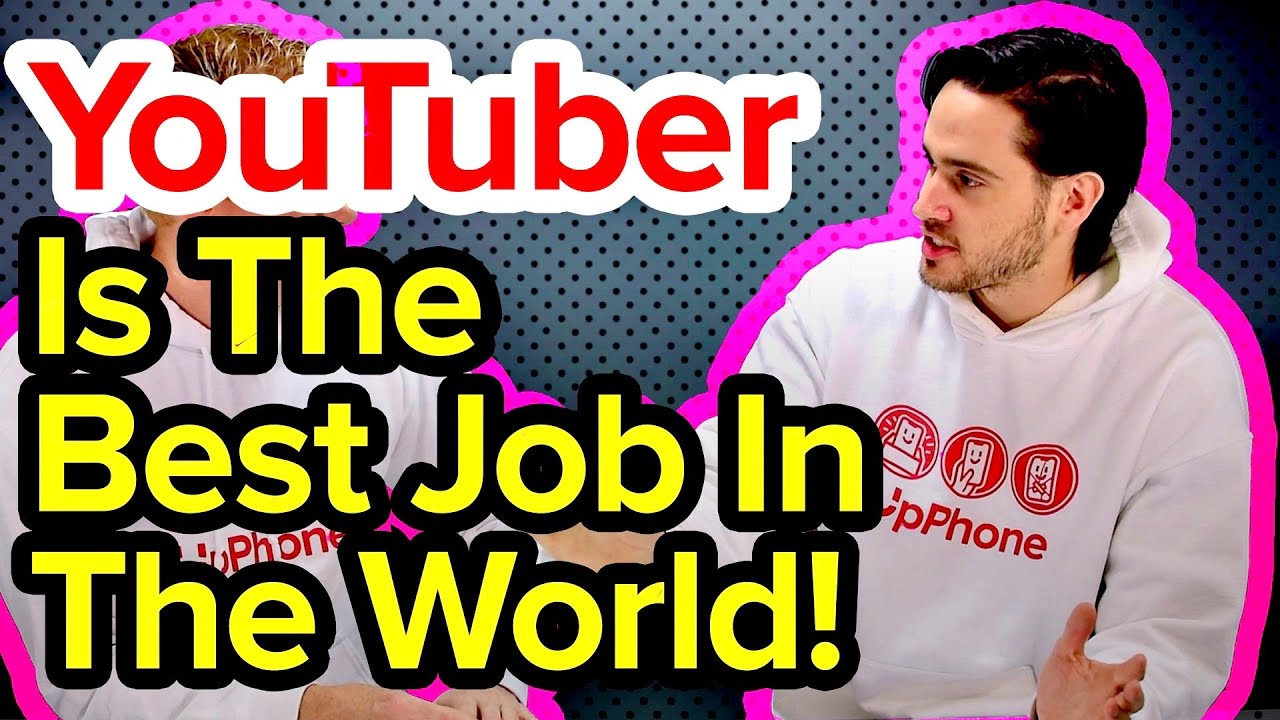YouTube has come a long way since its inception in 2005. What started as a platform for sharing fun videos has now blossomed into a full-fledged career path for many. The idea of becoming a YouTuber is appealing to countless individuals, but is it a legitimate job? In exploring this question, we’ll dive into what it really means to be a YouTuber, the dedication it requires, and the range of skills involved in content creation.
The Evolution of Content Creation

The journey of content creation on YouTube is nothing short of fascinating. Initially, users uploaded simple videos of their daily lives, quirky moments, or comedic skits. But as the platform grew, so did the expectations and quality of content. Here’s how content creation has evolved over the years:
- Early Days (2005-2010): Primarily home videos and vlogs with minimal editing. Think of it as the raw first draft of a novel.
- Rise of the Influencer (2010-2015): With the emergence of YouTube personalities—also known as influencers—content became more polished, and creators developed unique personas. Engaging storytelling became a priority.
- Monetization and Branding (2015-2020): YouTube introduced monetization options like AdSense, allowing creators to earn from their work. Brands also began to partner with YouTubers for sponsored content, making the platform a viable marketing tool.
- The Era of Professionalism (2020-Present): Nowadays, many creators invest in high-quality production, specialized equipment, and editing software. YouTube has morphed into a competitive landscape where creators often have to be multi-faceted, handling everything from video production to marketing and audience engagement.
In conclusion, while it might seem effortless to produce a single video, the evolution of content creation highlights substantial effort, talent, and strategy. What was once a casual hobby has transformed into a complex industry, making YouTube a legitimate career for many committed creators.
Also Read This: Understanding Adobe Stock Video Credits
3. Daily Responsibilities of a YouTuber

Being a YouTuber might seem like a dream job to many, but it comes with a laundry list of daily responsibilities that require dedication and commitment. Let’s dive into what a typical day might look like for a content creator.
- Content Planning: Every video starts with an idea. YouTubers spend considerable time brainstorming and researching trending topics that will engage their audience. This might involve watching other creators’ work, identifying gaps in the market, or even diving into audience analytics.
- Scripting and Storyboarding: Once the concept is locked, the next step is scripting. This helps in organizing thoughts and ensuring a logical flow of content. Some YouTubers prefer a loose script, while others may stick to a detailed outline.
- Filming: This is where the magic happens! Setting up cameras, lights, and audio systems takes time. Depending on the complexity of the video, it might take anywhere from a few hours to an entire day to shoot an episode.
- Editing: After filming, the real work begins. Editing can be a challenging task, as it involves cutting footage, adding effects, selecting music, and fine-tuning to ensure that the final product is polished and engaging.
- Promotion: Posting the video is just the beginning. YouTubers spend time promoting their videos across various platforms like Instagram, Twitter, and Facebook to maximize their reach and engagement.
- Engaging with the Audience: Responding to comments, participating in discussions, and gathering feedback is essential for building a loyal community. This interaction can influence future content as well.
So, while it may look effortless, the daily grind for a YouTuber is anything but easy. It’s a whirlwind of creativity, organization, and engagement.
Also Read This: Understanding Getty Images Contributor Payments
4. Monetization and Financial Aspects

Let’s face it; one of the most enticing aspects of being a YouTuber is the potential to earn money. But how does this actually work? Grab a comfy seat because we're about to break down the various monetization strategies available for creators.
| Monetization Method | Description |
|---|---|
| YouTube Ad Revenue | This is arguably the most common way YouTubers earn money. After reaching 1,000 subscribers and 4,000 watch hours over the past year, creators can enable ads on their videos, earning a share of the ad revenue based on views and interactions. |
| Sponsorships | Brands often reach out to YouTubers to showcase their products or services in exchange for payment. Rates can vary widely based on the creator’s audience size and niche. |
| Merchandise Sales | Many YouTubers create merchandise related to their branding, like T-shirts, mugs, and more, often promoting it through their videos to drive sales. |
| Affiliate Marketing | Creators can partner with companies and earn a commission for each sale generated through their unique affiliate links shared in video descriptions. |
| Memberships and Patreon | Some channels offer exclusive content or perks to subscribers and fans willing to pay a monthly fee, often facilitated through platforms like Patreon. |
While the financial aspects can be rewarding, it’s crucial to note that not every YouTuber rakes in substantial income right away. It often takes time to build an audience and diversify income streams. Many creators juggle YouTube content creation with other jobs until they can fully transition into this field.
Also Read This: Mastering Photoscape for Effortless Image Editing
5. Skill Development and Learning Curve

When you dive into the world of YouTube, you're not just pressing record and hoping for the best. There's a significant skill development and learning curve involved that many people overlook. From understanding the technical aspects of videography to mastering the nuances of editing, each element demands time and effort.
Here are some key skills a YouTuber typically develops:
- Filming Techniques: Knowing how to frame a shot, use lighting effectively, and choose the right equipment can make a huge difference in video quality.
- Editing Skills: Editing is where the magic happens! Familiarizing yourself with software like Adobe Premiere Pro or Final Cut Pro is essential for creating polished content.
- Storytelling: Every successful video tells a story. Learning how to structure your content to engage viewers is a skill that can be honed over time.
- SEO Knowledge: To get found, YouTubers need to understand search engine optimization (SEO) — from titles and descriptions to tags.
- Analytics Understanding: Knowing how to track and interpret YouTube Analytics helps creators understand their audience and optimize future content.
Beyond technical skills, there's also the need for personal growth. Creators often develop resilience, creativity, and time management skills, as balancing content creation with everyday life can be challenging. It’s like embarking on a journey where each video is a stepping stone toward mastering an intricate art form.
Also Read This: Supercharge Your Social Media Game With Pro Tips on Downloading Instagram Thumbnails
6. Community Engagement and Audience Building
One of the most rewarding aspects of being a YouTuber is the opportunity for community engagement and audience building. It’s not just about creating content; it’s also about fostering a sense of belonging among your viewers. Engaging with your audience can significantly affect your channel's growth and sustainability.
Here are some effective strategies for building a strong community:
- Consistent Interaction: Responding to comments, asking for feedback, and conducting Q&A sessions can make your audience feel valued and heard.
- Live Streams: Going live allows for real-time interaction and shows a more personal side of the creator, helping deepen viewer connections.
- Social Media Presence: Promoting your YouTube content on platforms like Instagram, Twitter, or TikTok helps to reach a broader audience and enables cross-platform engagement.
- Collaboration with Other Creators: Teaming up with other YouTubers can introduce your content to their audience, creating a win-win for both creators.
- Building a Brand Identity: Creating a consistent visual and thematic identity gives viewers something familiar to connect with each time they tune in.
Ultimately, community engagement is about authenticity. When you genuinely connect with your viewers, nurturing a supportive environment, it goes a long way in building loyalty and ensuring the longevity of your YouTube career. Remember, you’re not just a creator; you’re a part of a larger community! Embracing that mindset makes every video worth creating.
Also Read This: Simple Tips to Save Images from Google Slides
Challenges and Obstacles Faced by YouTubers
Being a YouTuber might seem like a dream job from the outside, but it's not all glitz and glamour. Behind the camera, content creators face numerous challenges that can make their journey both demanding and unpredictable. Let's delve into some of these hurdles:
- Content Creation Burnout: Consistently producing high-quality videos can be exhausting. Many YouTubers struggle with creative fatigue, which can lead to burnout. The pressure to regularly upload content can stifle creativity and motivation.
- Algorithm Changes: YouTube frequently updates its algorithms. These changes can significantly impact a creator’s visibility and subscriber growth, sometimes leading to drastic drops in views and revenue.
- Niche Saturation: With millions of channels across a vast range of topics, standing out in a crowded niche is tough. Many creators find it difficult to carve a unique space for themselves.
- Monetization Issues: Achieving monetization through ads requires meeting specific criteria, which can be daunting for new YouTubers. Furthermore, demonetization can strike unexpectedly, resulting in lost revenue.
- Negative Feedback: Public opinion can be harsh. Many YouTubers deal with trolls and criticism, which can affect their mental and emotional well-being.
- Time Management: Balancing content creation with personal life can be tricky. Many creators struggle to juggle their responsibilities, especially if they’re creating content full-time alongside other work or family obligations.
In essence, while YouTube offers exciting opportunities, it's not without challenges that require resilience and dedication.
Also Read This: How Imago Images Supports Inclusive Storytelling Through Diverse Imagery
The Future of YouTube as a Profession
The landscape of content creation is constantly evolving, and YouTube stands at the forefront of these changes. Looking ahead, one can't help but wonder: what does the future hold for YouTubers as professionals? Here are some key trends and factors to consider:
- Growing Acceptance: As digital media continues to expand, the perception of YouTubers as legitimate professionals is increasing. Brands are recognizing the influence of content creators, leading to more collaborations and sponsorships.
- Diversification of Income: Many YouTubers are seeking income beyond ads. They’re exploring merchandise sales, Patreon memberships, affiliate marketing, and live-streaming donations, creating multiple income streams!
- Technological Advancements: Innovations in technology, including AI and augmented reality, are providing creators with new tools to enhance their content, engage audiences, and improve production quality.
- Niche Markets: As specific interests emerge over time, there’s a growing demand for niche channels. Future YouTubers may find lucrative opportunities in specialized content that caters to dedicated audiences.
- Regulatory Changes: With issues surrounding copyright and online safety being at the forefront, impending regulations could shape how YouTubers operate, affecting their business models and content strategies.
Ultimately, the future of YouTube as a profession is bright but filled with both opportunities and challenges. Content creators will need to remain adaptable, continually honing their skills while being mindful of industry shifts.
Is Being a YouTuber a Legitimate Job? Exploring the Efforts Behind Content Creation
In recent years, the rise of social media platforms like YouTube has transformed the concept of work and employment. Many individuals aspire to become YouTubers, captivated by the allure of fame, creativity, and financial independence. However, is being a YouTuber truly a legitimate job? To answer this question, it’s essential to delve into the efforts required behind the scenes of content creation.
Creating successful YouTube content involves various responsibilities that demand considerable time, skill, and dedication. Below are some of the primary efforts that YouTubers invest in their channels:
- Content Planning: Identifying the target audience and brainstorming unique video ideas.
- Scriptwriting: Drafting scripts or outlines to ensure clarity and coherence in presentation.
- Video Production: Filming, editing, and producing videos using specialized software and equipment.
- Marketing: Promoting videos through social media platforms and engaging with followers to grow their subscriber base.
- SEO Optimization: Incorporating keywords and tags to enhance video visibility on search engines and YouTube.
- Analytics Tracking: Monitoring performance metrics to understand audience preferences and improve future content.
Furthermore, the journey of a YouTuber is fraught with challenges, such as fluctuating income, dealing with online criticism, and continuously evolving content demands. Despite these obstacles, many dedicated YouTubers cultivate loyal fanbases, create diverse revenue streams, and contribute significantly to the economy.
In conclusion, being a YouTuber can indeed be regarded as a legitimate job, given the extensive efforts, creativity, and business acumen required to succeed in this dynamic and competitive landscape.
 admin
admin








